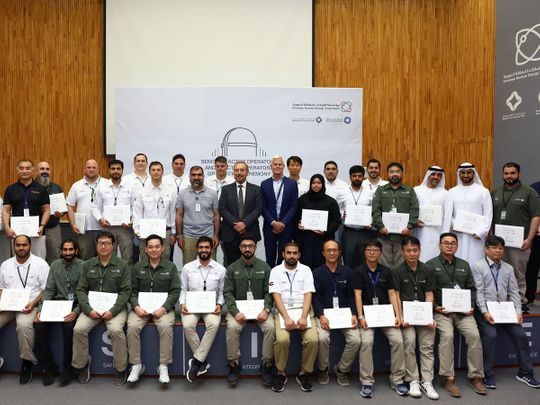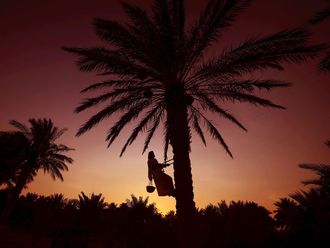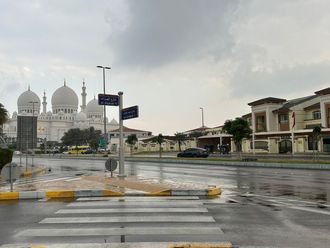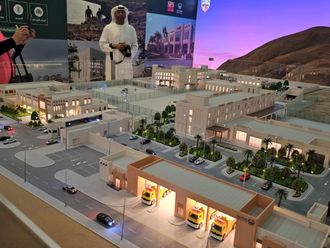
Abu Dhabi: With the certification of 39 more UAE citizens, the country now has 69 Emirati nuclear operators who are employed as senior reactor operators (SROs) and reactor operators (ROs), the Emirates Nuclear Energy Corporation (ENEC) has announced.
The Emiratis are among 193 nuclear operators in the country, and among them are nine women. They work alongside a host of international experts, and are certified to operate the Barakah Nuclear Energy Plant in Abu Dhabi, as part of the operations crew of the Nawah Energy Company. Nawah is the operations and maintenance subsidiary of ENEC, and is reposnbile for the plan’s operation and maintenance.
“When the Emirates Nuclear Energy Corporation was formed in 2009, the UAE did not have a single nuclear energy engineer. ENEC was not conncerned, as it followed the UAE’s leading approach to developing the national talent, and with it the national intellect that was required needed to ensure the sustainable success of its civil nuclear energy programme,” ENEC said.
“Today, the UAE Peaceful Nuclear Energy Programme has hundreds of Emiratis with nuclear engineering degrees. It has also added a further 39 certified Emirati nuclear operators to the 30 Emirati operators who have been certified since 2020.”
Who can qualify?
Each Emirati RO and SRO has received their certifications from the Federal Authority for Nuclear Regulation (FANR), the UAE’s independent nuclear regulator, after passing rigorous examinations.
“To become a qualified SRO and RO, each candidate needs to complete a comprehensive training programme in the most advanced nuclear energy plants around the world, alongside their academic learning in the UAE and abroad. The programme enables the operators acquire the knowledge and skills that allow them to manage a nuclear energy reactor through academic work, hands on experience, and development programmes,” ENEC said.
The operators also spend thousands of hours in the state-of-the-art simulators at Barakah to ensure they can competently manage any situation. To obtain the formal qualification and license, they sit rigorous examinations evaluated by FANR’s experts.”
With Units 1,2 and 3 at the Barakah plant in commercial operations, and Unit 4 in the final stage of commissioning, more operators are now in training to ensure a sustainable pipeline of talent for the next 60 years of operations, and the long-term success of the UAE Programme.
‘Inspired by pioneers’
“We have been inspired by previous energy pioneers here in the UAE who paved the way for us, and today Emiratis are at the forefront of one of the most important clean energy technologies globally for rapidly cutting carbon emissions. I am proud to work within a multi-national team and learn from experts from around the globe at the Barakah plant,” said Khalid Almarzooqi, a newly-certified SRO.
Mariam Alameri, one of the newly0certified female Emirati SROs, said: “I am proud to join our other female operators, alongside the many females working across every aspect of the UAE Peaceful Nuclear Energy programme. Comprising 20 per cent of our total workforce, ENEC and its subsidiaries has one of the highest percentages of females globally in the nuclear sector, highlighting the empowerment of women in our sector here in the UAE to deliver the clean energy transition to deliver Net Zero by 2050.”
Ahmed Jasem Al Zaabi has also recently been certified as an SRO.
“I look forward to working with a team that has developed a historic mega-project that is today powering homes, industries and businesses with clean electricity and will continue to do so for at least the next 60 years ahead. We have benefitted from years of advanced training to meet the UAE regulatory requirements and in line with the highest international standards of the global nuclear energy industry. This has equipped us with the experience, skills and knowledge needed to safely operate the Plant and lead our nation’s clean energy transition,” Al Zaabi said.
“I look forward to using all of my training and experience to work at the Barakah Plant. I know that through our work, we are driving the decarbonisation of the energy sector and supporting our nation in achieving Net Zero,” said Majed Al Mansoori, another SRO.
The Barakah Plant is accelerating the decarbonisation of the UAE’s power sector to support the development of the nation’s net zero economy, in addition to spearheading an increase in the intellectual wealth of the UAE with thousands of high-value career opportunities for Emiratis. It is also facilitating clean energy growth and innovation through research and development in clean energy.
Transition to sustainability
“The Barakah Plant is a powerhouse for the UAE’s sustainable development, energy security and stability, generating high-value jobs and stimulating the growth of local industries in addition to the significant environmental benefits for the nation over the next 60 years and beyond. It is this boost in national capabilities and national intellect that is so important for the UAE, with cross-pollination of skills and expertise planned across related sectors such as agriculture, medicine and deep space exploration. This will deliver the significant value nuclear energy has to offer beyond power generation,” ENEC said.
The Plant demonstrates the success of the UAE’s long-term investment to diversify its energy portfolio, while advancing towards a Net Zero future through nuclear energy. Gas demand for electricity is now at an 11-year low in Abu Dhabi because of the significant transformation in how the emirate is generating its electricity.
“ENEC is now leading efforts in research across areas like development of Small Modular Reactors (SMRs), clean hydrogen and other clean technologies. Barakah provides electricity at all times of the day and night, sustainably powering the nation’s growth. Once fully operational, the four units of Barakah will provide up to 25 per cent of the UAE’s electricity needs,” the authority added.









